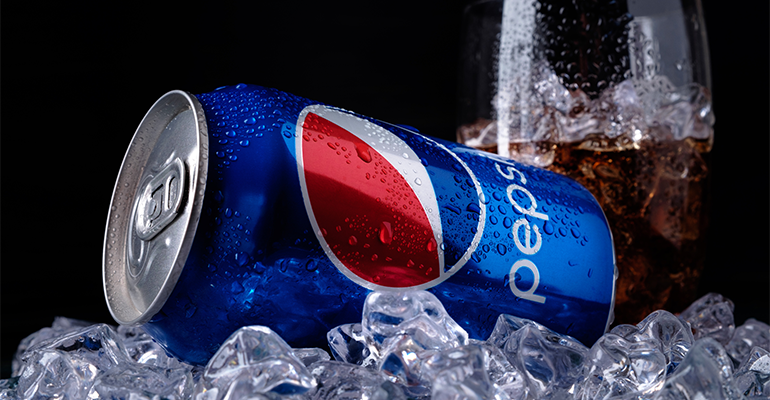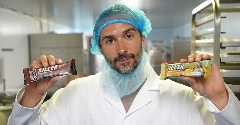News
PepsiCo feels the heat as drinks giant cools its climate targets
3 Jul 2025PepsiCo has become the latest global food and beverage manufacturer to attract criticism for changing a number of its environmental goals.
The owner of Pepsi, Doritos, and Lay’s said its “refined” climate, packaging, agriculture, and water goals “continue to build a stronger, more resilient business that aims to drive scalable positive impact”.

The company pointed to the expansion of its target on regenerative agriculture practices – from 7 million across to 10 million acres by 2030. At the last count, in 2023, it had managed 1.8 million acres.
However, campaigners and investors have questioned many of the other changes, which follow in the footsteps of those made by Unilever and Coca-Cola in the past few months.
“We clearly can’t trust corporations like PepsiCo to do what’s best for people and the planet,” said Greenpeace USA senior ocean campaigner Lisa Ramsden, “and this exemplifies why voluntary commitments made by corporations have never been enough”.
Some investors suggested that PepsiCo had shown ambition but had provided little evidence of progress. Conrad MacKerron, senior vice president of shareholder advocacy group As You Sow, said “this appears to be an opportunistic move, in a deregulating political environment”. He added: “Shareholders expect companies to keep their commitments regardless of which way the political winds are blowing.”
In December 2024, Coca-Cola announced that it was “evolving” its voluntary environmental goals, while in May 2024, Unilever, which owns Ben & Jerry’s, Magnum, and Hellman’s, also changed most of its ESG (environmental, social, and governance) goals. Some were enhanced, but others were watered down, according to a detailed analysis by Planet Tracker, an NGO.
Pepsi’s green glass is half full
PepsiCo’s changes – detailed in full on its website – follow almost four years of learnings since the launch of its PepsiCo Positive (pep+) business strategy, said Archana Jagannathan, chief sustainability officer for the company in Europe, Middle East, and Africa.
Gone is the target to deliver 20% of its beverages in reusable containers by 2030, alongside an ambition to cut virgin plastic from non-renewable sources per serving across its entire beverage and convenient food portfolio by 50% by 2030.
The business blamed “lagging infrastructure” and investment for its new “pragmatic” approach to packaging. PepsiCo, which uses over 2.5 million tonnes of plastic packaging every year, is now focusing on “absolute virgin tonnage plastic reduction”. Use of virgin plastic increased 6% between 2020 and 2023 against a target to cut use by 5% by 2025, under the global commitment on plastic run by the Ellen MacArthur Foundation, a think tank.
Targets to reduce greenhouse gas emissions have also been altered. The ambition to achieve net-zero is now set for 2050 rather than 2040, while reductions in scope 1, 2, and 3 emissions have been lowered, and the baseline against which these are set has changed (from 2015 to 2022).
PepsiCo’s latest ESG report showed total emissions have been reduced by 4% against the (now defunct) target of more than 40% by 2030.
More recent data, published in May in its new climate transition plan, shows total emissions in the baseline year were 54MtCO2e. Some 92% of these are in ‘scope 3’, originating up and down the value chain: 40% are from the production of agricultural ingredients, including those arising from land-use change and land management (like deforestation), with another 26% coming from packaging.
The scope 3 emissions struggle
Other large manufacturers have also struggled to reduce their total emissions – and in some cases emissions have been found to be rising rather than falling as companies expand their operations, make acquisitions, and struggle to contain (and in many cases accurately measure) their scope 3 emissions.
Jagannathan said PepsiCo’s updated targets remain “fully aligned to a 1.5°C trajectory by 2050 and reflecting SBTi guidance on Forests, Land, and Agriculture (FLAG) and Energy and Industrial (E&I) emissions”. She added: “By refining these goals, we are further aligning resources with core business priorities and helping our sustainability ambitions remain actionable and achievable.”
Related news

How younger consumers are redefining ingredient choices and rejecting brand loyalty
18 Nov 2025
Gen Z and millennial consumers’ preferences for transparency, functionality, and purpose are “redefining the very nature of consumption itself”, says SPINS.
Read more
Hybrid formats and flexible positioning to disrupt category norms in 2026
17 Nov 2025
Trend forecasters expect food and drink to move more fluidly across occasions, functions, and formats as consumers seek versatility, novelty, and convenience.
Read more
Empowering innovation in fortification and colouration
13 Nov 2025
Divi’s Nutraceuticals offers a large portfolio of innovative, high-quality ingredients for foods, beverages, and supplements, with bespoke solutions and expert support for product success.
Read more
From fruit to functional solutions: Meet Paradise Fruits at Fi Europe in Paris
13 Nov 2025
Paradise Fruits Solutions and Paradise Fruits Health will showcase their combined expertise in delivering innovative, fruit-based solutions to the food and beverage industry at the upcoming Fi Europe trade show (2-4 December 2025, Paris).
Read more
New UPF standard hoped to offer consumers ‘coherence and clarity’
10 Nov 2025
Ingredients companies are being urged to enter “a new era of partnership and innovation” following the launch of the industry’s first non-UPF verification scheme.
Read more
Cottage cheese makes a comeback as consumers call for cleaner labels
6 Nov 2025
From ice cream to dips and ready meals, cottage cheese is experiencing a renaissance as a high-protein, clean ingredient for health-conscious consumers.
Read more
Ingredient quantities mislabelled on popular protein bars, independent tests show
5 Nov 2025
Some popular protein bars contain more fat, carbs, and/or sugars than claimed on their labels, independent nutrition testing reveals.
Read more
Does promoting protein content push up plant-based sales?
27 Oct 2025
Promoting the protein content of meat-free products is a more effective sales strategy than adding carbon labels, a study of UK bakery chain Greggs suggests.
Read more
Agrigum Redefined FIBER
27 Oct 2025
Agrigum has transformed gum acacia into a natural, science-backed fibre that supports gut health, sustainability, and innovation across global food and nutrition applications.
Read more
Will Wicks’ Killer Bar harm the protein bar category?
23 Oct 2025
Joe Wicks’ deliberately dangerous protein bar is fuelling anti-UPF sentiment – but there are concerns that his messaging is misguided and could have unintended consequences.
Read more